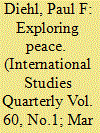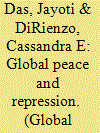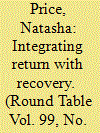| Srl | Item |
| 1 |
ID:
146178


|
|
|
|
|
| Summary/Abstract |
Concern about war and large-scale violence has long dominated the study of international security. To the extent that peace receives any scholarly attention, it primarily does so under the rubric of “negative peace:” the absence of war. This article calls for a focus on peace in international studies that begins with a reconceptualization of the term. I examine the limitations of negative peace as a concept, discuss “positive peace,” and demonstrate empirically that Nobel Peace Prize winners have increasingly been those recognized for contributions to positive peace. Nevertheless, scholarly emphasis remains on war, violence, and negative peace—as demonstrated by references to articles appearing in a leading peace-studies journal and to papers presented at International Studies Association meetings. Peace is not the inverse or mirror image of war and therefore requires different theoretical orientations and explanatory variables. The article concludes with a series of guidelines on how to study peace.
|
|
|
|
|
|
|
|
|
|
|
|
|
|
|
|
| 2 |
ID:
112798


|
|
|
|
|
| Publication |
2012.
|
| Summary/Abstract |
Past research and historical events suggest that the relationship between the peacefulness of a country and the degree of political and civil liberties afforded to its citizens has an inverted U-shape relationship such that the greatest unrest is observed at an intermediate level of freedom. Using the Global Peace Index (GPI), developed by the Institute for Economics and Peace (2010) in collaboration with the Economist Intelligence Unit, this study empirically tests this relationship and the results offer support for this nonlinear relationship. It is argued that while highly repressed societies experience a 'controlled' peace, highly free societies also experience peace stemming from the basic freedoms such as the right to expression and assembly and participation in policy creation. Alternatively, when political and civil freedoms are at some intermediate level, the freedoms offered may not be strong enough to serve as a substitute for protest, yielding greater conflict, crime, and less peace. Policy implications of the findings are also offered.
|
|
|
|
|
|
|
|
|
|
|
|
|
|
|
|
| 3 |
ID:
099751


|
|
|
|
|
| Publication |
2010.
|
| Summary/Abstract |
Following the defeat of the Liberation Tigers of Tamil Eelam (LTTE) on 18 May 2009, Sri Lanka has recently entered a new era of negative peace. For the huge number of displaced persons, predominately of Tamil origin, who are currently trapped in camps in the North, the beneficial effects of peace remain unseen. This paper explores the links between resolving internal displacement and the transition to a positive peace. Under the 2002 Ceasefire Agreement, both the government and the LTTE failed to integrate return with recovery, undermining the wider peacebuilding process and contributing to further violence. In the context of military victory, the paper argues for an integrated approach to return and recovery, which will foster a new social contract between the government and internally displaced persons, utilising the return process in the transition to positive peace
|
|
|
|
|
|
|
|
|
|
|
|
|
|
|
|